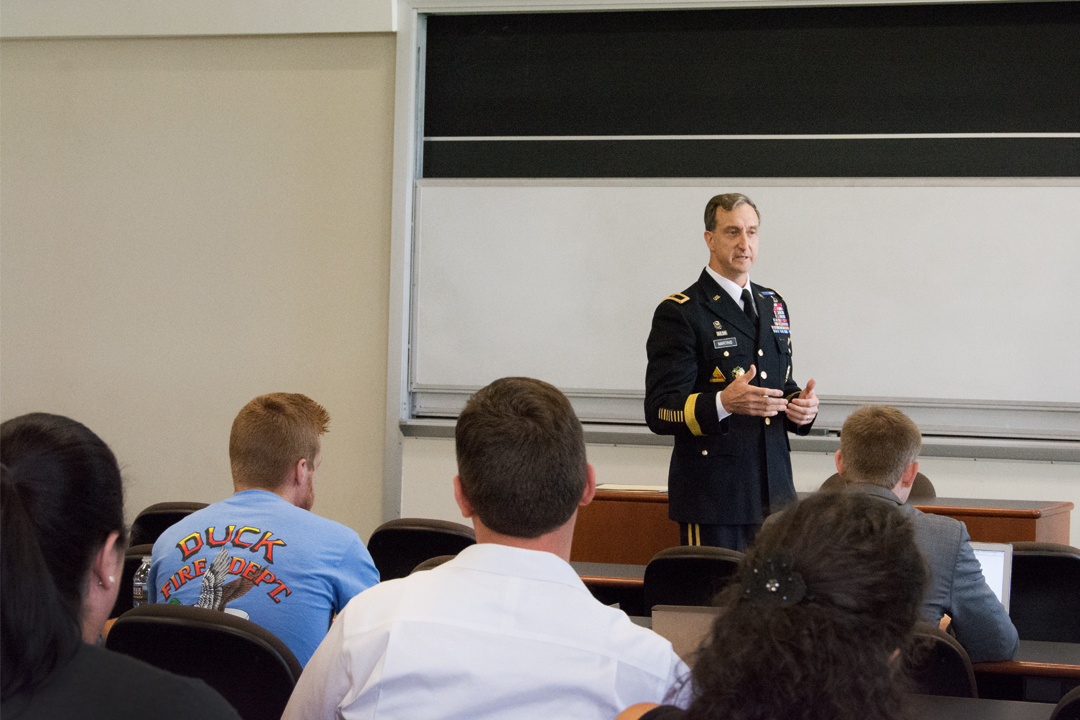U.S. Army Brigadier General Mark S. Martins, Chief Prosecutor, Office of Military Commissions, visited GW Law for a discussion with students about the United States military commissions system. Military Commissions are special tribunals that have jurisdiction to try war crimes as defined by Congress. General Martins is overseeing the trials of Khalid Sheik Mohammed and co-defendants, who are accused of crimes arising out of the 9/11 attacks. In his remarks, General Martins defended the military commissions against assertions that these trials and the process are "unfair, unsettled, unknown, unbounded, unnecessary, un-American, and unsuccessful."
General Martins, an accomplished member of the U.S. Army Judge Advocate General's Corps, served multiple tours in Iraq and Afghanistan and was the chief military attorney for General David Petraeus. He also has held a number of prestigious leadership positions, serving as the staff judge advocate for commanders at all levels of the Army. General Martins graduated first in his class from the U.S. Military Academy, served as an Infantry Officer, was a Rhodes Scholar, and is a Harvard Law School graduate.
Military commissions are run by the U.S. Armed Forces. Traditionally, military commissions have been used to dispense battlefield justice–to try captured combatants for violations of the laws of war. They have also served as a substitute for civilian courts during periods of martial law or temporary military rule over enemy territory. General Martins explained that American military commissions date to the times of the American Revolution during the prosecution of John André, a British Army officer who was hanged as a spy by the Continental Army during the American Revolutionary War.
It has been a longstanding United States practice that military commissions function as closely as possible to courts-martial. Military commissions can try individuals for traditional war crimes and an array of terrorism-related and other crimes. Though sometimes controversial, General Martin explained that they are rooted in U.S. law and in the international laws of war. Currently, a "convening authority" appointed by the U.S. Secretary of Defense convenes military commissions under the Military Commissions Act of 2009, passed by the U.S. Congress and signed by former President Barack Obama.
General Martins discussed criticisms surrounding military commissions. For years, critics have argued that military commissions lack fair trial protections and have questioned whether they are necessary. General Martins disagreed, asserting: "It is a fair process, we are committed to carrying out our oaths. It's a sharp and adversarial process, and it has a lot of independent constraints throughout the process to make sure that it is fair. Of course, it's subject to judicial review." He added that views of what is fair in military trials has changed over time, saying, "This is a process that is affording extraordinary amount of due process and zealous advocacy on both sides." After concluding his remarks, General Martins responded to numerous student questions.
Susana Watkins, a National Security & U.S. Foreign Relations Law LL.M. candidate, said she was "impressed with the candor and thoughtfulness with which General Martins addressed the concerns regarding the military commissions."
General Martins is one of the speakers invited by the National Security LLM Program, which routinely hosts talks by experts in the National Security field. In the past, the Program has hosted prominent speakers such as Secretary of the Air Force Deborah Lee James and former CIA Acting General Counsel John Rizzo.


